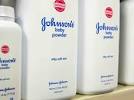 Pharmaceutical company Johnson & Johnson was ordered to pay $72 million in damages ($10M in actual damages and $62M in punitive damages) to the family of a woman who died from ovarian cancer in 2015. This Alabama woman had reportedly used baby powder and other talcum power products for over 35 years. In its natural form, talc can sometimes contain asbestos, which is known to cause cancers in and around the lungs when inhaled. However, since the 1970s, no talcum products sold in the U.S. have contained asbestos. The evidence around asbestos-free talcum products and cancer risk is more unclear.
Pharmaceutical company Johnson & Johnson was ordered to pay $72 million in damages ($10M in actual damages and $62M in punitive damages) to the family of a woman who died from ovarian cancer in 2015. This Alabama woman had reportedly used baby powder and other talcum power products for over 35 years. In its natural form, talc can sometimes contain asbestos, which is known to cause cancers in and around the lungs when inhaled. However, since the 1970s, no talcum products sold in the U.S. have contained asbestos. The evidence around asbestos-free talcum products and cancer risk is more unclear.
The American Cancer Society reports that the outcome of research into the potential link between talcum powder and ovarian cancer is mixed, as some studies found a slightly increased risk in women who reported using talcum powder in the genital area, while other studies reported no increased risk at all. Experts note that those studies finding an increased risk might not be highly accurate, because they relied on the subjects’ memory of talc use many years prior to the actual study.
Baby Powder made from cosmetic talc is one of Johnson & Johnson’s oldest products and a longtime part of baby care rituals. Their baby powder continues to be popular with adults as well, and in many parts of the world, it remains an essential part of makeup and skin care routines. Talc is also used in toothpaste, chewing gum, aspirin, and other consumer products. The company says, “With over 100 years of use, few ingredients have the same demonstrated performance, mildness and safety profile as cosmetic talc. Our confidence in using talc reflects more than 30 years of research by independent scientists, review boards and global authorities, which have concluded that talc can be used safely in personal care products. Various government agencies and other bodies also have examined talc to determine the potential for any safety risks, and none have concluded that there are safety risks. In fact, no regulatory agency has ever required a change in labeling to reflect any safety risk from talc powder products. “
During the Johnson & Johnson trial, the woman’s lawyers alleged Johnson & Johnson was knowledgeable of the potential risk of using products containing talc for feminine hygienic use. The AP reported on a 1997 internal memo from a company medical consultant that said “anybody who denies” the risk of using hygienic talc and ovarian cancer is “denying the obvious in the face of all evidence to the contrary.”
Carol Goodrich, a Johnson & Johnson spokeswoman, said the company stands by the talc used in all “global products” and they are “evaluating” their legal options. The company is expected to appeal the verdict.
“The recent U.S. verdict goes against decades of sound science proving the safety of talc as a cosmetic ingredient in multiple products, and while we sympathize with the family of the plaintiff, we strongly disagree with the outcome,” Goodrich said in a statement.
Nora Freeman Engstrom, a Stanford University law professor, told AP the decision “doesn’t bode well” for the company, which is facing 1,200 still-pending lawsuits.
Sources: http://www.cbsnews.com/news/johnson-johnson-verdict-can-talcum-powder-really-cause-cancer/
http://www.safetyandcarecommitment.com/ingredient-info/other/talc?&utm_source=google&utm_medium=cpc&utm_campaign=J%26J+-+Talc+Powder&utm_term=johnson%27s%20baby%20powder%20safety&utm_content=J%26J+Talc+Safety+-+B|mkwid|sbSgO72Yo_dc|pcrid|85363849814
